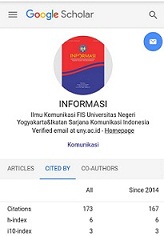24/7 news network: A paradigm shift in the media industry
DOI:
https://doi.org/10.21831/informasi.v54i1.65887Keywords:
media paradigm, news network, mass media, 24/7, media transformationAbstract
This research aims to investigate the role of 24/7 news networks in transforming how the media industry presents, consumes, and interacts with news. To achieve this goal, the study conducts a literature review on the development and evolution of 24/7 news networks and their impact on society. The analysis results show that 24/7 news networks have significantly changed the media landscape. Firstly, their ability to deliver news instantly and in real-time has shifted traditional news reporting models that relied on print editions or scheduled broadcasts. Second, the adoption of multimedia formats in 24/7 news network platforms has enhanced interactivity and reader engagement in the news process. However, the media industry faces challenges in dealing with this phenomenon. The demand to provide non-stop news puts pressure on journalists and editors to remain relevant and accurate in delivering information. Additionally, the emergence of social news platforms has brought new issues related to the validity and credibility of news. This article also highlights the social impact of 24/7 news networks. Easy access to news anytime and anywhere has influenced how society consumes news and interacts with information. Moreover, ethical questions arise on how to manage the information overload presented by 24/7 news networks without compromising the reliability of sources.
References
Biocca, F. (2000). New Media Technology And Youth: Trends In The Evolution Of New Media. Journal Of Adolescent Health, 27 (2), 22–29. Https://Doi.Org/10.1016/S1054-139X(00)00136-1
Boczkowski, P. J. (2004). The Processes Of Adopting Multimedia And Interactivity In Three Online Newsrooms. Journal Of Communication, 54 (2), 197–213. Https://Doi.Org/10.1093/Joc/54.2.197
Cottle, S., & Rai, M. (2008). Global 24/7 News Providers. Global Media And Communication, 4 (2), 157–181. Https://Doi.Org/10.1177/1742766508091518
Deuze, M. (2004). What Is Multimedia Journalism1? Journalism Studies , 5 (2), 139–152. Https://Doi.Org/10.1080/1461670042000211131
Greer, C., & Mclaughlin, E. (2011). 'Trial By Media': Policing, The 24-7 News Mediasphere And The 'Politics Of Outrage.' Theoretical Criminology , 15 (1), 23–46. Https://Doi.Org/10.1177/1362480610387461
Johnston, J., & Forde, S. (2009). "Not Wrong For Long": The Role And Penetration Of News Wire Agencies In The 24/7 News Landscape.
Jones, J.P. (2023). If It Feeds, It Leads: Food Journalism, Care Ethics, And Nourishing Democracy. Journal Of Media Ethics, 38 (3), 132–145. Https://Doi.Org/10.1080/23736992.2023.2228294
Khan, A., Brohman, K., & Addas, S. (2022). The Anatomy Of 'Fake News': Studying False Messages As Digital Objects. Journal Of Information Technology , 37 (2), 122–143. Https://Doi.Org/10.1177/02683962211037693
Kim, B., Xiong, A., Lee, D., & Han, K. (2021). A Systematic Review On Fake News Research Through The Lens Of News Creation And Consumption: Research Efforts, Challenges, And Future Directions. PLOS ONE , 16 (12), E0260080. Https://Doi.Org/10.1371/Journal.Pone.0260080
Lestari, RD (2019). Shifting Journalistic Ethics In The Internet Age, Case Study: Violation Of Journalistic Ethics In Journalistic Products And Journalist Behavior In Online Media. Communicator, 11 (2). Https://Doi.Org/10.18196/Jkm.112027
Nahdiah, S., & Agustin, CA (2017). News Credibility Perception Based On Media. Asian Journal Of Media And Communication , 1 (2), 105–112. Https://Doi.Org/10.20885/Asjmc.Vol1.Iss2.Art1
Nasir, O. Bin, Weaver, C. K., & Schott, G. (2023). Ethical Guidelines And Practices For Pakistani Television Journalists Reporting On Domestic Violence. Journal Of Media Ethics , 38 (3), 146–161. Https://Doi.Org/10.1080/23736992.2023.2228307
OHMAE, J. (1995). The Impact Of Multimedia On Mass Communication. The Effect Of Multimedia On Social Life. 4. Journal Of Information Processing And Management , 38 (4), 369–379. Https://Doi.Org/10.1241/Johokanri.38.369
Ott, T., & Tiozzo, M. (2022). Digital Media Ethics. International Journal Of Mobile And Blended Learning , 14 (2), 1–8. Https://Doi.Org/10.4018/IJMBL.304459
Pennycook, G., & Rand, D. G. (2021). The Psychology Of Fake News. Trends In Cognitive Sciences , 25 (5), 388–402. Https://Doi.Org/10.1016/J.Tics.2021.02.007
Potter, W. J., Cooper, R., & Dupagne, M. (1993). The Three Paradigms Of Mass Media Research In Mainstream Communication Journals. Communication Theory , 3 (4), 317–335. Https://Doi.Org/10.1111/J.1468-2885.1993.Tb00077.X
Prus, R. (2017). Kenneth Burke's Dramatic Pragmatism: A Missing Link Between Classical Greek Scholarship And The Interactionist Study Of Human Knowing And Acting. Qualitative Sociology Review , 13 (2), 6–58. Https://Doi.Org/10.18778/1733-8077.13.2.01
Rahmanian, E. (2023). Fake News: A Classification Proposal And A Future Research Agenda. Spanish Journal Of Marketing - ESIC , 27 (1), 60–78. Https://Doi.Org/10.1108/SJME-09-2021-0170
Ravenelle, A. J., Newell, A., & Kowalski, K. C. (2021). "The Looming, Crazy Stalker Coronavirus": Fear Mongering, Fake News, And The Diffusion Of Distrust. Socius: Sociological Research For A Dynamic World , 7 , 237802312110247. Https://Doi.Org/10.1177/23780231211024776
Riskos, K., Dekoulou, P., & Tsourvakas, G. (2019). User Interactivity In Online Newspapers: Exploring The Relationship Between Content Features And User Response. Newspaper Research Journal , 40 (2), 155–176. Https://Doi.Org/10.1177/0739532918814465
Saragih, MY (2021). Law, Journalistic Profession And Mass Media Ethics. Budapest International Research And Critics Institute (BIRCI-Journal): Humanities And Social Sciences , 4 (2), 2532–2540. Https://Doi.Org/10.33258/Birci.V4i2.1957
Schulz, A., Fletcher, R., & Nielsen, R. K. (2022). The Role Of News Media Knowledge For How People Use Social Media For News In Five Countries. New Media & Society, 146144482211089. Https://Doi.Org/10.1177/14614448221108957
Strasser, M. A., Sumner, P. J., & Meyer, D. (2022). COVID-19 News Consumption And Distress In Young People: A Systematic Review. Journal Of Affective Disorders, 300, 481–491. Https://Doi.Org/10.1016/J.Jad.2022.01.007
Sugiyono. (2018). Qualitative And Quantitative Rnd Research Methods. Alphabet.
Sundar, S.S. (2000). Multimedia Effects On Processing And Perception Of Online News: A Study Of Picture, Audio, And Video Downloads. Journalism & Mass Communication Quarterly , 77 (3), 480–499. Https://Doi.Org/10.1177/107769900007700302
SZABO, L.-V. (2021). Mass Media, Social Media And Technological Evolution Today: A Theoretical Approach. Journal Of Media Research , 14 (3(41)), 95–105. Https://Doi.Org/10.24193/Jmr.41.6
Zheng, J., & Mason, D. S. (2022). New Media, Digitalization, And The Evolution Of The Professional Sport Industry. Frontiers In Sports And Active Living, 4. Https://Doi.Org/10.3389/Fspor.2022.921329
Downloads
Published
How to Cite
Issue
Section
Citation Check
License
Authors who publish with this journal agree to the following terms:
- Authors retain copyright and grant the journal right of first publication with the work simultaneously licensed under a Creative Commons Attribution License that allows others to share the work with an acknowledgement of the work's authorship and initial publication in this journal.
- Authors are able to enter into separate, additional contractual arrangements for the non-exclusive distribution of the journal's published version of the work (e.g., post it to an institutional repository or publish it in a book), with an acknowledgement of its initial publication in this journal.
- Authors are permitted and encouraged to post their work online (e.g., in institutional repositories or on their website) prior to and during the submission process, as it can lead to productive exchanges, as well as earlier and greater citation of published work (See The Effect of Open Access).











